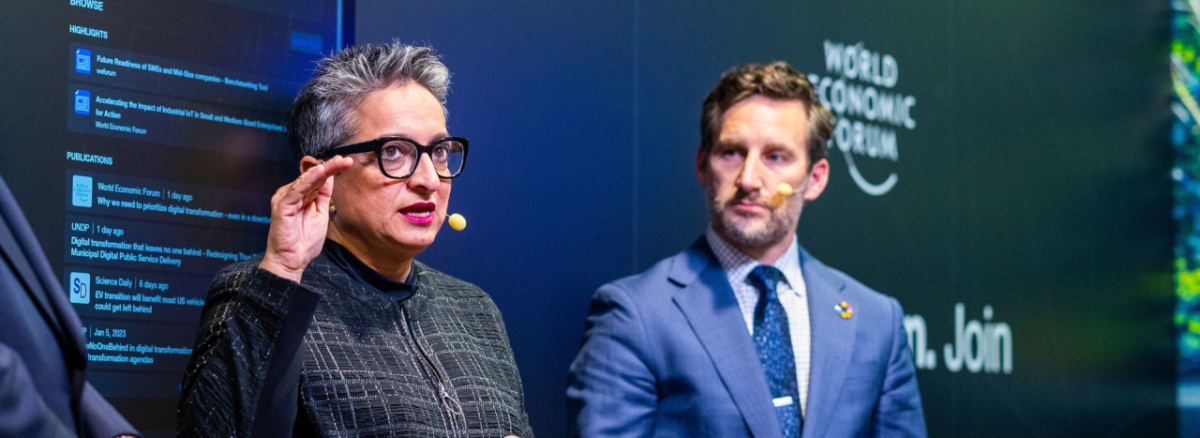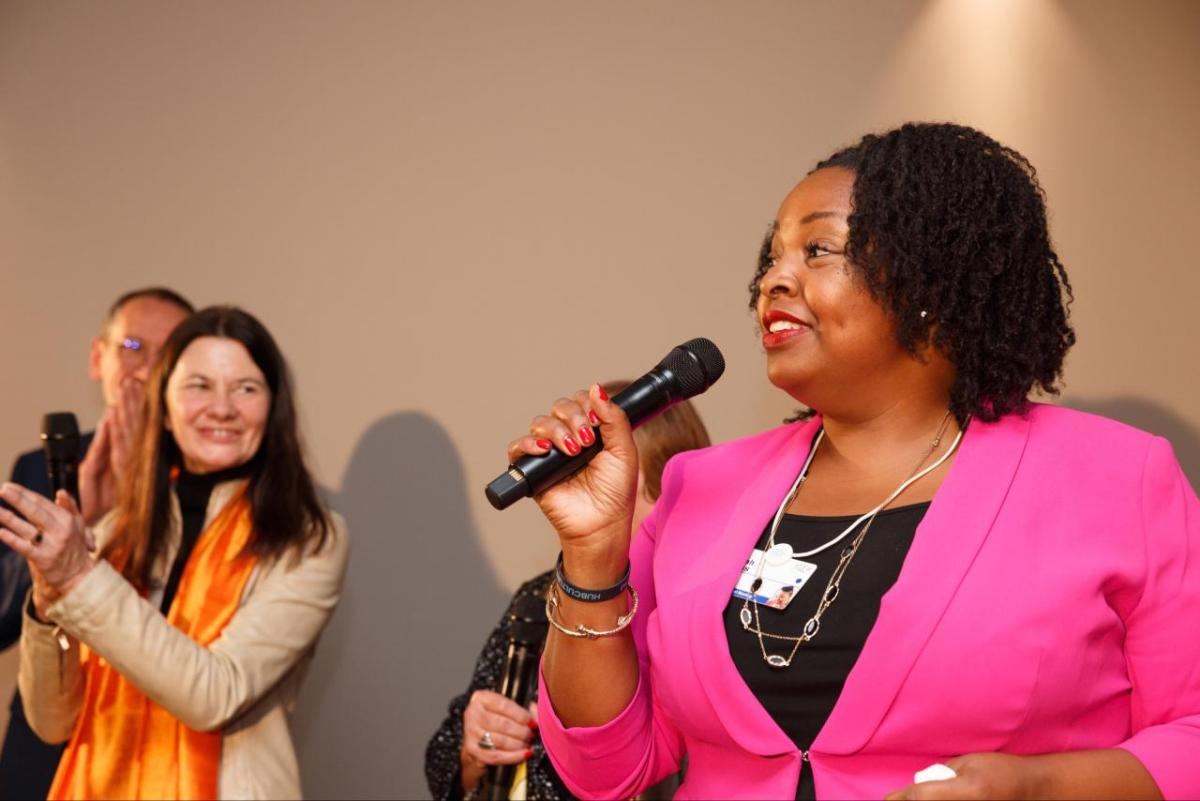Mastercard’s Davos Takeaways: The Economy, Blockchain and Building Trust by Accelerating Inclusion
Published 6 hours ago
Submitted by MasterCard Center for inclusive growth

The Mastercard Center for Inclusive Growth
DAVOS – As multiple crises continue across the globe – including a war just 1,200 miles from this small Swiss village – policymakers gathered this past week at the World Economic Forum’s annual conference. Many struck hopeful notes about the state of the economy, the power of data to fight inequality and the potential for collaboration to solve global challenges.
About 2,700 policy makers, finance and technology leaders, celebrities, journalists, academics and activists gathered in Davos to debate topics such as deglobalisation, decarbonisation, mistrust and digitization under the theme “Cooperation in a Fragmented World.”
“If we can unleash the innovation and motivation of the private sector,” said Michael Froman, Mastercard vice president and president of Strategic Growth in a panel on innovation for social good, “we can scale commercially sustainable social impact.”
Here are four takeaways from Davos 2023:
01 Guarded optimism on the economy: Despite fears of a slowdown, many CEOs and government officials were cautiously optimistic, with Citigroup CEO Jane Fraser telling CNBC that in the US, a “mild, manageable recession scenario, driven by the strength we have in labor markets,” is likely.
“For Europe, we should avoid a recession, which I would not have said with such confidence three months ago,” said François Villeroy de Galhau, the governor of the Bank of France in the panel “The Role of Finance in a Recovery.” “We will win, at the end of the day, the fight against inflation.”
On the same panel, Mastercard CEO Michael Miebach ticked off some positive signs: relatively low unemployment, strong consumer balance sheets and nimble consumers. “A common trend across the board is that spending on essential versus discretionary spending has increased, but within that the consumer is trying to make trade-offs,” he said. “Headline: The consumer is resilient.”
Watch the video here

02 ESG is not going away: Companies continue to embrace – and work to deliver – commitments they have made on environmental and social goals. At the “Stewarding Responsible Capitalism” panel, Bank of America CEO Brian Moynihan called for a set of official global standards to protect against bad practices and “align capitalism with what society wants from it and get us moving faster.”
But realizing the power of the private sector to meet climate and equity goals may require buy-in outside the boardroom. Sustainability should not be a vertical – it should run across and throughout the business, said Mastercard’s Chief Sustainability Officer Ellen Jackowski.
“When it comes to private sector involvement in inclusion and ESG, it works best when companies do things that are genuine and authentic and additive to their core business.” Michael Froman
That’s why Mastercard last year changed its compensation model for all employees to tie bonus pay to the company’s progress on its ESG priorities, she said, mirroring what it had done for executive pay in 2021. “When you build in that incentive, they go to be much more motivated to be part of that solution and make better choices,” she said at The Female Quotient’s panel “The Cost of Technology.”
“When it comes to private sector involvement in inclusion and ESG,” Froman said on the panel on innovation for social impact, “it works best when companies do things that are real and authentic and additive to their core business.”
03 New technology requires more consideration: After the recent spate of high-profile implosions in the crypto space, it’s no surprise that the perception of crypto at Davos was analytical, with calls for more regulation from, yes, regulators, but also CEOs. More clarity will be key to bringing in established players, and regulation can create the barriers to scale, Miebach said on the mining panel. “I think we’re at that point on the road to making this a formidable ecosystem that can solve a lot of problems.”
Many remain bullish on the blockchain technology powering crypto, with UBS president Colm Kelleher calling it “unstoppable.”
And just like the rest of us, Davos attendees couldn’t stop talking about ChatGPT and the potential of artificial intelligence—and the pitfalls that range from bias to more sophisticated cyberattacks to privacy. “As we use AI across product development,” said Jorn Lambert, Mastercard’s chief digital officer, in an interview with Axios, “we have principles that we follow to ensure that the consumer knows how their data is being used. We must protect that data and use them with consideration.”
04 Digitization and data are the key to inclusion – and so is trust: And inclusion can be a way to foster trust, said Salah Goss, director of social impact for North America at the Mastercard Center for Inclusive Growth at the “Disrupting Mistrust” panel. “If you can believe that your participation in the system actually leads to prosperity, you begin to trust it more and more … If you don’t have access and you don’t have equity, you’re more distrustful.”
The small business sector can greatly benefit from continued digitization and deeper collaboration across the financial sector, Ling Hai, Mastercard’s co-president of International Markets, told Hub Culture. Entrepreneurs drive a lot of innovation, but they often lack access to credit, which can stifle their potential. That’s because lenders often have no insight into your creditworthiness. “With digitization, there is so much data,” he said. “The question is, how do you use data responsibly to make loans and at the same time protect the privacy of small businesses?”
Helping to close the information inequality gap—between the data haves and the data have-nots—can unlock enormous potential for nonprofits and others looking to close other types of equity gaps, said Shamina Singh, president of the Mastercard Center for Inclusive Growth at the Panel “Data Collaboration : Lessons from the field”. “We are investing in building the field of data science for social impact, which means building the capacity of social sector organizations to realize the power of their own data.”
The economy, trade tensions and the conflict in Ukraine made headlines, and the debate flared over protectionism, but the return of travel to pre-pandemic levels, consumer resilience and the reopening of borders also dominated the conversation. And most seemed willing to embrace the theme of collaboration and get started. Said Singh at the annual Women’s Leadership Reception, “We all have something to say, we all have something to hear, now we all have something to do.”
This story was written by Vicki Hyman in New York with reporting from Biz Cozine, Alisdair Haythornthwaite and Lia Mausolf in Davos.
Originally published by The Mastercard Center for Inclusive Growth
Check out more content from The Mastercard Center for Inclusive Growth

MasterCard Center for inclusive growth
MasterCard Center for inclusive growth
The Mastercard Center for Inclusive Growth focuses on promoting equitable and sustainable economic growth and financial inclusion worldwide. As an independent Mastercard subsidiary, it combines data, expertise and technology with philanthropic investment to empower a community of thinkers, leaders and innovators on the front lines of inclusive growth. Follow us on Twitter @CNTR4growth and subscribe to receive our latest insights.
More from MasterCard Center for inclusive growth


